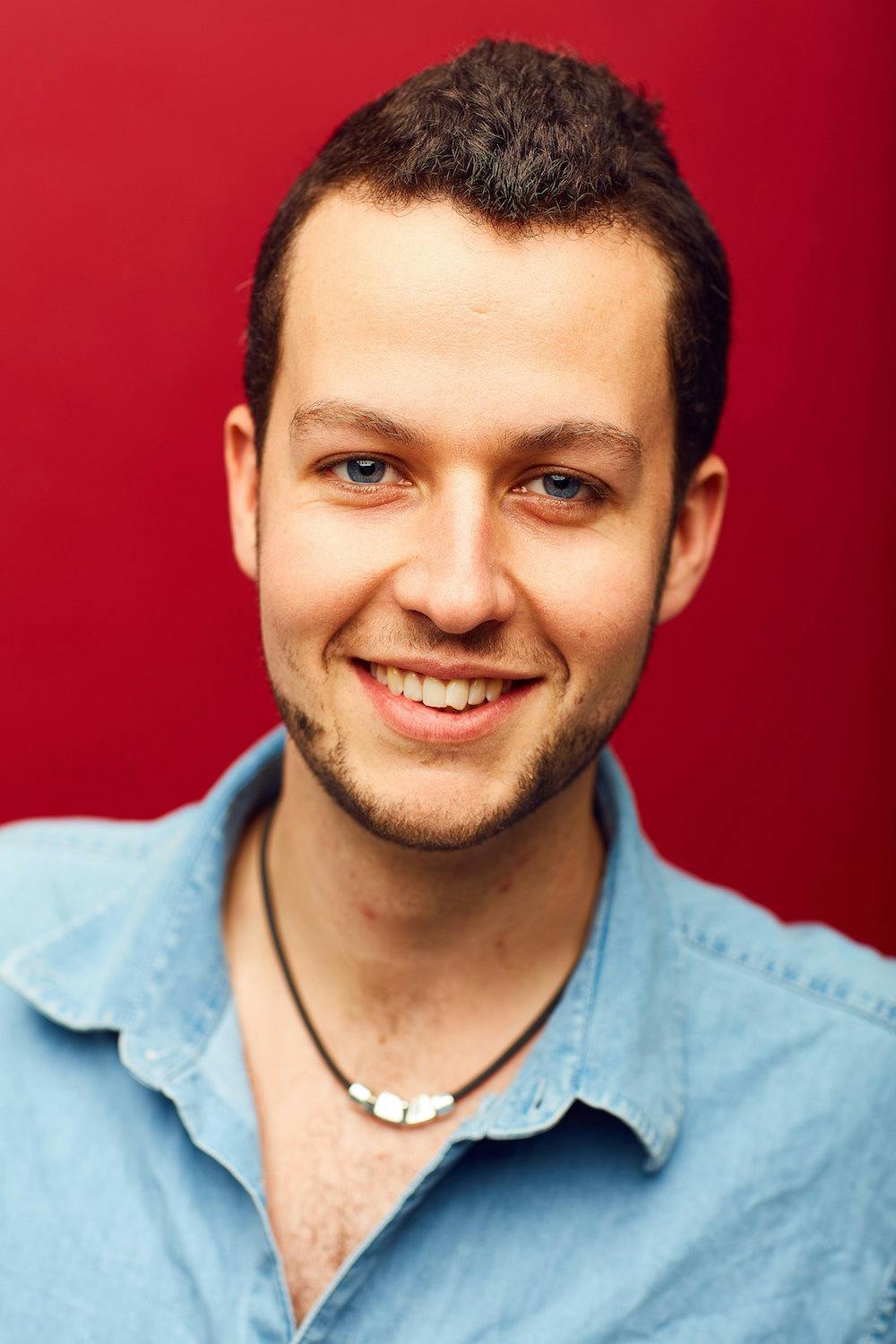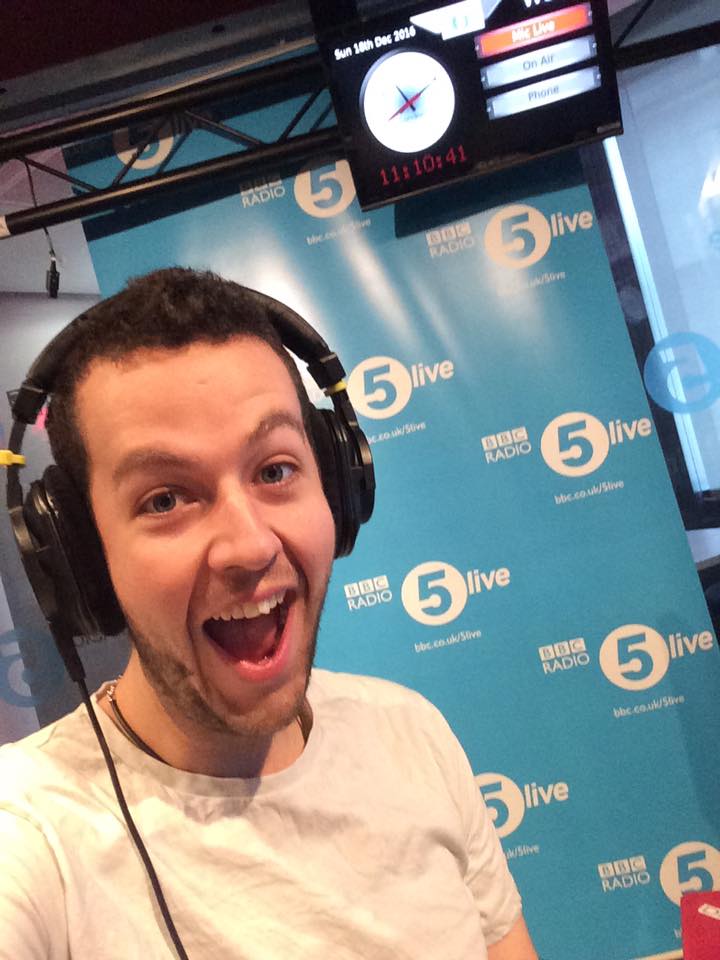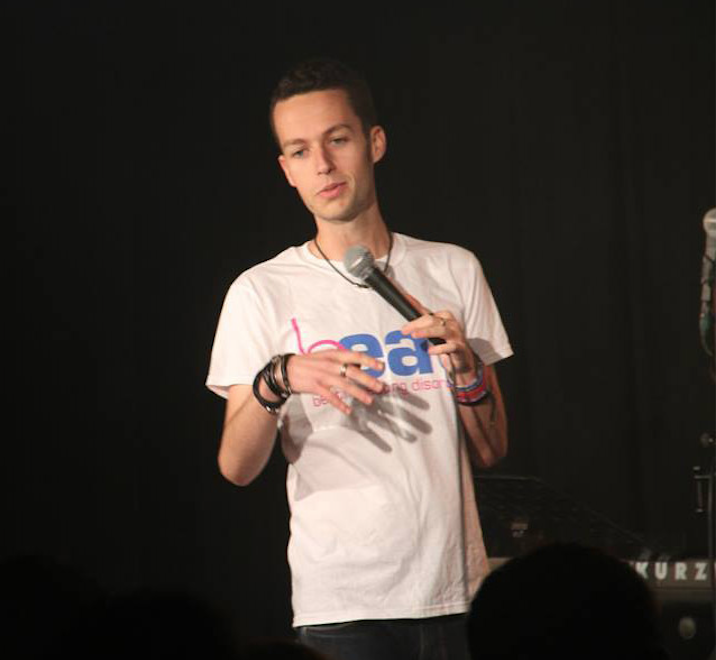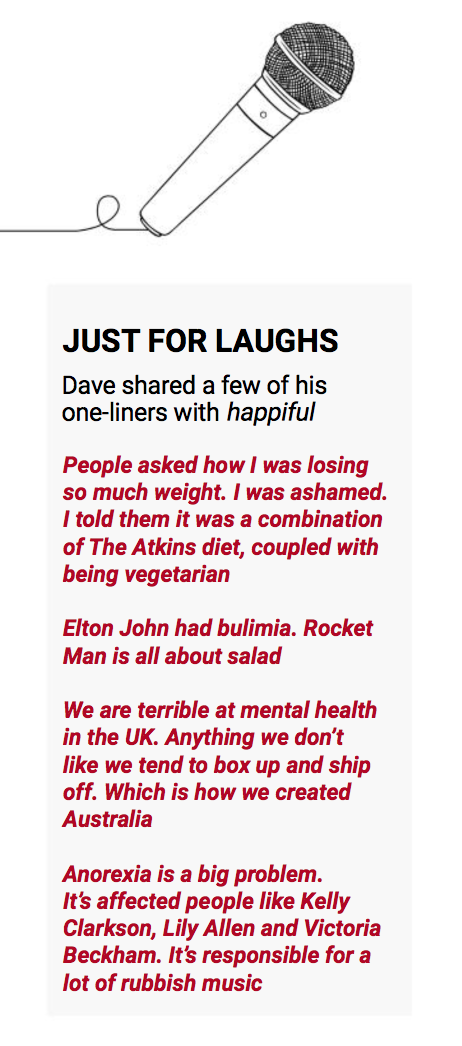I refuse to be embarrassed about my anorexia
updated on Jan 20, 2023

Stand up comedian Dave Chawner is on a mission to break the silence of eating disorders – by making people laugh
Comedian Dave Chawner, 28, not only makes your sides split, but opens your eyes to mental health issues. As a campaigner for Beat, the UK’s leading eating disorder charity, he wants to share his battles with anorexia with mainstream audiences. We caught up with Dave for a chuckle and a chat.
When did your relationship with food start to become unhealthy?
I was very lucky in the place I grew up. Nothing traumatic happened, and I didn’t have access to drugs or drink. But I felt like I had no coping mechanism, and in a subliminal response to my situation, the anorexia became something I used to distract me from everyday life.
Anorexia is such an insidious, secretive disease, and there are so many signs that people don't recognise
I got a lead role in a play, and had to appear topless in it. That was the first time I’d ever really thought about my body. Then I started dating this girl who was amazing and wonderful – my first-ever girlfriend. She broke up with me at the same time that I had exams looming and UCAS applications. It was all going on at once.
When I began to lose weight, people told me ‘you look good’, ‘this is good’, ‘well done’. And I started to associate losing weight with being ‘good’, which is a kind of strange societal thing we have where we demonise weight. It became a diseased coping mechanism that, I’m not going to lie, I absolutely loved. It took years for me to realise that what I was doing was unhealthy.
Did you obsess over numbers – like BMI or calories?
One of the most common things with eating disorders is that people don’t feel ‘anorexic enough’. Even though I was severely, clinically anorexic, I never tell anyone my BMI or weight from back then, because even now I still feel ashamed that it was too high.
Anorexia is such a greedy disease that you’re never good enough, never anorexic enough. I think focusing on BMI is a fundamental misunderstanding of mental illness. That’s where we need to educate people. If someone said to me, ‘I’ve got cancer’, I would never dream of asking, ‘How big is the lump?’ I would never think of treating any other health condition like that. As soon as we start seeing the people and the patients behind those numbers, we can break that stigma.

You ended up in hospital for ‘coffee-loading’ – where people consume larger amounts of caffeine to sustain energy and stave off hunger. How did you find the support in hospital?
My treatment has been wonderful. I can’t help but think that my treatment has been better because I’m a bloke with anorexia. If you read the literature, 10 years ago anorexia was described as ‘silly, white, middle-class girls’, but as soon as we recognised that men get eating disorders, it’s like it’s the first time people take it seriously. I walked into that Eating Disorders Unit and I was that purple cow.
There’s another thing that’s very common in anorexia, because when you stop feeding your body, it obviously doesn’t have any fuel so you become constantly cold. And when I say cold, I mean pathologically cold. I went to the doctor and he said, ‘Look mate, put on a jumper.’ I’m not having a go at GPs at all, but it’s such an insidious, secretive disease, and there’s so many signs that people don’t recognise. For anorexia and bulimia it’s things like coffee-loading, obsessively using chewing gum, and rituals with food or going to the bathroom. We tend to see people who are very anxious and perfectionistic. There are loads of different indicators that are just not getting picked up at the moment.
At what point did you realise you needed help?
When I was 17, I slipped into it, but it took until I was 20 or 21 to realise I was anorexic. I was working in a boarding school over the summer holidays and all the food was catered for – pizza, pasta, chips. There was no calorific value, no choice, no healthy option, and it amazed me how much I began to unthread. I skipped meals, exercised during the night, drank too much coffee, and would binge and purge. One of the teachers came up to me and went ‘I’ve been in therapy for bulimia three times, and I thought you might be anorexic?’ She just said it in a normal, non-sensationalistic way, and asked me rather than telling me that I was anorexic.
When I started doing this show, four or five years ago, I started talking about the anorexia and that insidious ‘not feeling anorexic enough’ came up again. A couple of close friends knew this, and it was difficult, but I actively wanted to die from it. I don’t mean that in a melodramatic way. I knew the way it would go. I knew my medical history. It was only when the depression got me that I was really like ‘I can’t bear this.’ I wasn’t feeling sad and listening to Damien Rice – I was feeling nothing. I felt nothing for so long that I went to the doctor. I got referred on, and refused treatment for the anorexia four times because I said ‘Please, please, please, don’t take this away from me.’ Luckily, a woman at Lambeth Talking Therapies said ‘You know what, we can treat the depression and not the anorexia, but you wouldn’t expect your laptop to work if you didn’t charge it. So, bottom line, we can treat it, but it’ll do f*ck all.’ I had to make a decision, and I genuinely just couldn’t bear the depression.
You speak very openly about what you went through in your comedy shows. Is it easier for friends and family to discuss it with you now?
Because I didn’t choose to have anorexia, I refuse to be embarrassed about it and can talk very openly to anyone about it. But with my parents and sister, I just can’t. It’s the guilt. It’s the one thing I don’t think I’ll ever get over. They didn’t do anything wrong. They couldn’t have done anything. But I still put them through hell and that’s something I don’t think I’ll ever be able to reconcile.
I'd love to reach an audience who have no experience of mental illness, and have them turn around and say, 'I get it. I understand it'
What advice do you have for anyone concerned that someone is suffering in silence from an ED?
What really resonates with me is that because something is bruised or broken you can say to get help, but because you can’t see mental health you don’t treat people like that. Asking people rather than telling them, and saying ‘It’s not a big deal. Everyone has different ways of coping with stuff.’
I’ve been so lucky to have so many wonderful, amazing people supporting me, but my dad, far and away, has been the best because when I first got my diagnosis he said ‘I’ll be honest, I don’t mean this with any disrespect, but I don’t get it.’ And that was amazing for me, because for the first time I could say, ‘You know what, I don’t really get this either.’ He said, ‘Okay, well let’s work on this together.’ He acknowledged that it’s okay to not know, and to try and work things out rather than having all the answers.
What professional support did you get?
Generally, 76 percent of people with restrictive eating disorders tend to get depression. The reason being that the brain needs 1,000 calories a day to release chemicals like serotonin and endorphins. First-line treatment is normally anti-depressants. I also had talking therapies, which was an hour every week talking to a therapist and untangling those knots I’d put myself in. I think talking therapies are perfect for everyone because you don’t have to be a body-builder to go to the gym, so why do you have to be absolutely at crisis point to go to therapy? I had a course of Cognitive Behavioural Therapy, which didn’t work for me, but there are so many other options to tailor how different brains work and how different people react to therapy.

What’s it like to discuss EDs in your stand up?
I remember seeing people like Chris Addison, Russell Howard, and Michael McIntyre before they were big, and the thing that got me was the honesty. Russell Howard’s talking about being socially awkward. Michael McIntrye’s talking about being tired because he’s struggling being a dad. Chris Addison’s talking about being poor and not fitting in. Those are really serious topics and I was like ‘If I can do that with mental health, that would be amazing.’
There’s the quote that ‘comedy is just tragedy plus time’, and I think there’s a huge truth in that. I’m not saying anorexia is laughable. I’m not saying that eating disorders are funny. I’m saying they’re a very serious part of life, but so is laughter, and it’s a release. If you can use a release to talk about something that’s quite encapsulating, then that’s perfect.
How does the audience react to your jokes?
I’ll never forget I did a gig with a wonderful comic, John Ryan, who’s a mental health campaigner as well and does a lot with the armed services. Years ago, he said he’d just done a gig with army lads and ‘they laughed not because they wanted to, but because they needed to’. It’s almost cathartic for the audience, where they think ‘Oh my god, I used to do that. I now realise that’s pathological.’
One of the travesties and tragedies of eating disorders is that while they affect all ages, we know that the main people affected are between 13 and 21. It can take away your childhood. It’s nice to give that back through the laughter.
What’s the response been like from men?
I’ll never forget one of the first previews of the show I did in a working men’s club. I walked in and there were tattooed blokes eating a buffet, and I thought ‘I’m going to be sliced and diced. I’m going to come out of here in a body bag.’ But it was amazing that even though it was something a lot of them couldn’t relate to, they came up afterwards and said, ‘Fair play, mate.’ I think those are the people I want to reach most. It’s lovely helping the people who’ve experienced this, but part of the battle is already won with them because they understand it’s something important and it’s just about trying to make them feel less stigmatised by it. In the long-term, I’d love to reach an audience of people who have no experience of mental illness, and have them turn around and say ‘I get it. I understand it, and I enjoyed it.’

How did you first get involved with Beat?
I approached them about four years ago. Since then, the relationship has gone from strength to strength, and I’ve done everything with them from photoshoots to literature reviews, all the way through to the fun stuff like representing them on BBC breakfast and hosting the Comedy Store for them.
It’s an incredibly exciting time for Beat. Only recently, I met with them in the Houses of Parliament for a private interview with Jeremy Hunt, the Secretary of State for Health. Beat are putting in huge strides to increase their political relationships, but they’re also opening up their helpline 364 days a year, which is incredible. It’s lovely to raise money for them because I know that every pound goes where it needs to.
What are your plans for this year?
After two years in the making, I’ve just been given a book deal! The preliminary date for it to be out is, hopefully, by the end of the year. I’m working on a new show for next year as well, about mental health rather than mental illness – not just appealing to the eating disorders side of things, but looking at recovery and getting an identity back.
You can keep track of Dave’s campaigning on Twitter
(@DaveChawner). To catch his live gigs, visit davechawner.co.uk for details. You can find out more about Beat at www.b-eat.co.uk

